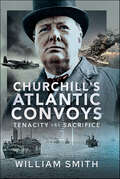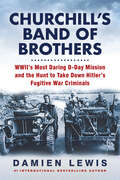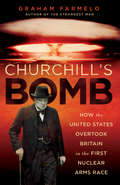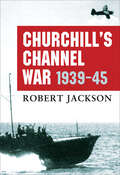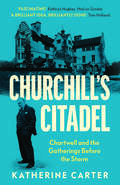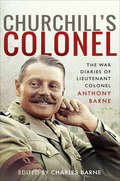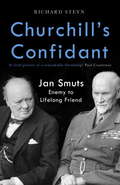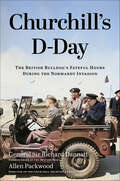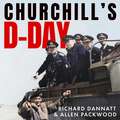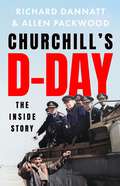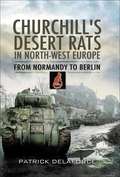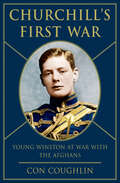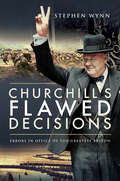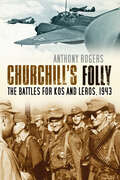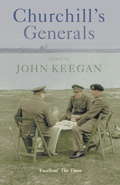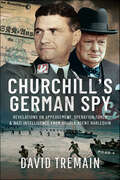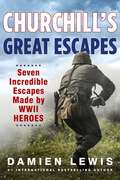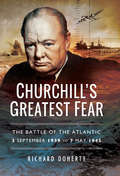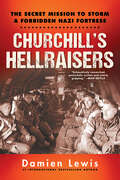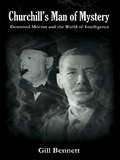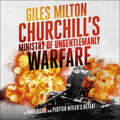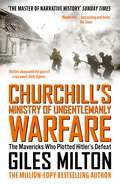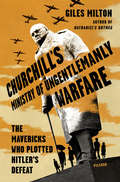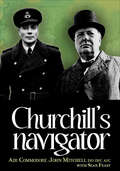- Table View
- List View
Churchill's Atlantic Convoys: Tenacity & Sacrifice
by William SmithWithin hours of the outbreak of the Second World War, Winston Churchill took up office as First Lord of the Admiralty. The same day the liner Athenia was torpedoed in the Atlantic in the first U-boat attack of the war. Churchill quickly recognized Britain’s survival depended on countering the U-boat threat and the strategic importance of protecting Allied merchant shipping with measures such as the convoy system. As this superbly researched book reveals, the Nazi U-boat fleet was relatively small and unprepared for war in 1939. But by early 1941 its numbers and effectiveness had increasing to the point that Hitler was able to declare ‘our warfare at sea is just beginning’. Prime Minister Churchill’s response was to issue his famous ‘Battle of the Atlantic’ Directive. Churchill’s Atlantic Convoys describes the political, strategic and tactical ebb and flow of events, particularly between 1942 and 1943. Thanks to increased numbers and scientific innovations the Allies slowly gained the upper hand despite a determined German fight back in late 1943 and early 1944. While the U-boat threat was never wholly defeated, the tenacity and sacrifices of the Allied naval forces won the day. Churchill later recognized the persistence of Germany’s effort and the fortitude of the U-boat service. It would not be until 7 June 1945 that Churchill and President Truman felt able to assert ‘the Allies have finished the job’.
Churchill's Band of Brothers: WWII's Most Daring D-Day Mission and the Hunt to Take Down Hitler's Fugitive War Criminals
by Damien LewisOne of WWII&’s most daring Allied D-Day missions and the hunt for Hitler&’s war criminals is brought to breathtaking life by award-winning, bestselling war reporter Damien Lewis. Award-winning, bestselling author Damien Lewis explores one of WWII&’s most remarkable Special Forces missions during the Normany landings on D-Day—and the extraordinary hunt that followed to take down a cadre of fugitive SS and Gestapo war criminals. On the night of June 13th, 1944, a twelve-man SAS unit parachuted into occupied France. Their objective: hit German forces deep behind the lines, cutting the rail-tracks linking Central France to the northern coastline. In a country crawling with enemy troops, their mission was to prevent Hitler from rushing his Panzer divisions to the D-Day beaches and driving the Allied troops back into the sea. It was a Herculean task, but no risk was deemed too great to stop the Nazi assault. In daring to win it all, the SAS patrol were ultimately betrayed, captured, and tortured by the Gestapo before facing execution in a dark French woodland on Hitler&’s personal orders. Miraculously, two of the condemned men managed to escape, triggering one of the most-secretive Nazi-hunting operations ever, as the SAS vowed to track down every one of the war criminals who had murdered their brothers in arms . . . all with Churchill&’s covert backing. With Nazi Germany&’s lightning seizure of much of Western Europe, British Prime Minister Winston Churchill had called for the formation of specially trained troops of the &“hunter class.&” Their purpose was to incite a reign of terror across enemy-occupied Europe. Churchill&’s warriors were to shatter all known rules of warfare, taking the fight to the enemy with no holds barred. In doing so, the Special Air Service would be tested as never before during the pivotal D-Day landings, and the quest for vengeance that followed. Breathtaking and exhaustively researched, Churchill&’s Band of Brothers is based upon a raft of new and unseen material provided by the families of those who were there. It reveals the untold story of one of the most daring missions of WWII, that not only had ramifications for the war itself, but lead to the most extraordinary and gripping of aftermaths.
Churchill's Bomb: How the United States Overtook Britain in the First Nuclear Arms Race
by Graham FarmeloPerhaps no scientific breakthrough has shaped the course of human history as much as the harnessing of the atom. Yet the twentieth century might have turned out entirely differently had this powerful technology stayed under the control of Great Britain, whose scientists spearheaded the AlliesOCO nuclear arms program at the outset of World War II. As award-winning science historian Graham Farmelo reveals in "ChurchillOCOs Bomb," BritainOCOs supposedly visionary leader remained unconvinced of the potentially earth-shattering implications of his physicistsOCO research. Churchill ultimately shared BritainOCOs nuclear secrets with?and ceded its initiative to?America, whose successful development and deployment of an atomic bomb placed the United States in a position of supreme power at the dawn of the Nuclear Age. A groundbreaking investigation of the twentieth centuryOCOs most important scientific discovery, "ChurchillOCOs Bomb" reveals the secret history of the weapon that transformed modern geopolitics. "
Churchill's Channel War
by Robert JacksonFrom the beaches of Dunkirk to the launch of Operation Overlord, the Channel saw continuous action during World War II, and was the world's most fought-over waterway. In this fascinating account, Robert Jackson offers a study of the Channel War from 1939-45, detailing the German threats to British shipping, the use of convoys and the extensive minelaying operations, as well as the Battle of Britain, the use of long-range artillery and everything in between. As well as offering a study of the furious Channel War battles, Jackson also reveals how the Channel was essential for the launch of Churchill's famed special forces Commandos, who, under the cover of darkness, launched raids on Occupied France as well as the Channel Islands. The Channel War bought together the Royal Navy and Air Force, as they both battled to defend England and prevent a much feared German invasion.
Churchill's Citadel: Chartwell and the Gatherings Before the Storm
by Katherine CarterA major new history of Churchill in the 1930s, showing how his meetings at Chartwell, his country home, strengthened his fight against the Nazis In the 1930s, amidst an impending crisis in Europe, Winston Churchill found himself out of government and with little power. In these years, Chartwell, his country home in Kent, became the headquarters of his campaign against Nazi Germany. He invited trusted advisors and informants, including Albert Einstein and T. E. Lawrence, who could strengthen his hand as he worked tirelessly to sound the alarm at the prospect of war. Katherine Carter tells the extraordinary story of the remarkable but little known meetings that took place behind closed doors at Chartwell. From household names to political leaders, diplomats to spies, Carter reveals a fascinating cast of characters, each of whom made their mark on Churchill’s thinking and political strategy. With Chartwell as his base, Churchill gathered intelligence about Germany’s preparations for war—and, in doing so, put himself in a position to change the course of history.
Churchill's Colonel: The War Diaries of Lieutenant Colonel Anthony Barne
by Anthony BarneA British officer&’s day-to-day observations throw &“interesting light on life and soldiering during the Second World War.&” —The NYMAS Review Anthony Barne started his diary in August 1939 as a young, recently married captain in the Royal Dragoons stationed in Palestine. He wrote an entry for every day of the war, often with great difficulty, sometimes when dog-tired or under fire, sometimes when things looked dark and desperate, but more often in sunshine and optimism—&“surrounded by good fellows who kept one cheerful and helped one through the sad and difficult times.&” His diary ends in July 1945, by which time he was commanding officer of the 4th Hussars, having recently visited Downing Street for lunch alone with the Churchills. The diaries have an enormous scope, covering time in Palestine and Egypt before he joins the Eighth Army, describing the retreat back to El Alamein, the battle and its aftermath. He ends the campaign commanding his regiment. He often graphically details the physical realities of war: the appalling conditions in the desert, the bombardments of the regiment from the air, the deaths and serious injuries of fellow soldiers. In 1943, he flies down to Rhodesia to see his wife and infant son before returning to Cairo to join Churchill&’s regiment, the 4th Hussars. Arriving in Italy in 1944, he recounts the campaign as the Allies push north. With a tone that varies wildly—often witty, sometimes outrageous, but also poignant and philosophical—this is not just a memoir of war but a portrait of another time that showcases the author&’s warmth and keen eye for the absurd.
Churchill's Colonel: The War Diaries of Lieutenant Colonel Anthony Barne
by Anthony BarneA British officer&’s day-to-day observations throw &“interesting light on life and soldiering during the Second World War.&” —The NYMAS Review Anthony Barne started his diary in August 1939 as a young, recently married captain in the Royal Dragoons stationed in Palestine. He wrote an entry for every day of the war, often with great difficulty, sometimes when dog-tired or under fire, sometimes when things looked dark and desperate, but more often in sunshine and optimism—&“surrounded by good fellows who kept one cheerful and helped one through the sad and difficult times.&” His diary ends in July 1945, by which time he was commanding officer of the 4th Hussars, having recently visited Downing Street for lunch alone with the Churchills. The diaries have an enormous scope, covering time in Palestine and Egypt before he joins the Eighth Army, describing the retreat back to El Alamein, the battle and its aftermath. He ends the campaign commanding his regiment. He often graphically details the physical realities of war: the appalling conditions in the desert, the bombardments of the regiment from the air, the deaths and serious injuries of fellow soldiers. In 1943, he flies down to Rhodesia to see his wife and infant son before returning to Cairo to join Churchill&’s regiment, the 4th Hussars. Arriving in Italy in 1944, he recounts the campaign as the Allies push north. With a tone that varies wildly—often witty, sometimes outrageous, but also poignant and philosophical—this is not just a memoir of war but a portrait of another time that showcases the author&’s warmth and keen eye for the absurd.
Churchill's Confidant: Jan Smuts, Enemy to Lifelong Friend
by Richard SteynBrought together first as enemies in the Anglo-Boer War, and later as allies in the First World War, the remarkable, and often touching, friendship between Winston Churchill and Jan Smuts is a rich study in contrasts. In youth they occupied very different worlds: Churchill, the rambunctious and thrusting young aristocrat; Smuts, the aesthetic, philosophical Cape farm boy who would go on to Cambridge. Both were men of exceptional talents and achievements and, between them, the pair had to grapple with some of the twentieth century's most intractable issues, not least of which the task of restoring peace and prosperity to Europe after two of mankind's bloodiest wars.Drawing on a maze of archival and secondary sources including letters, telegrams and the voluminous books written about both men, Richard Steyn presents a fascinating account of two remarkable men in war and peace: one the leader of the Empire, the other the leader of a small fractious member of that Empire who nevertheless rose to global prominence.
Churchill's D-Day: The British Bulldog's Fateful Hours During the Normandy Invasion
by Richard Dannatt Allen PackwoodFrom the world’s greatest collection of Winston Churchill’s personal papers comes the genesis, execution, and aftermath of D-Day through his own eyes.On June 6, 1944, the landings from the greatest armada of ships ever assembled began at 0630 hrs. Overnight, paratroopers from the British 6th Airborne Division had secured the eastern flank of the landing zone with the US 82nd and 101st Airborne Division securing the western flank to reduce the risk of German counterattacks.The Allied battle, codenamed “Operation Overlord,” had begun.In Churchill’s D-Day, Richard Dannatt former leader of the British Army, and Allen Packwood, one of the world’s foremost Churchill experts, capture the British Bulldog’s emotional turmoil and epic decision-making before, during, and after the world-defining action of D-Day. Culled from the official Churchill Papers at the Churchill Archives Centre, this book features historical documents, photographs, letters, and more, for a documentary Churchillian experience of D-Day leadership, military strategy, and humanity.As the people of Great Britain awake to the news of the landings on their radios, the burden of making a formal statement to the House of Commons falls on the shoulders of their prime minister. While Churchill is aware of the huge responsibility he bears for the British soldiers and French civilians, knowing his political opponents will question his leadership, no one else in the world is aware of the conversations, innermost thoughts, and deliberations leading up to the decisions he’s made and will continue to make on this day. Everything hangs in the balance.Churchill’s D-Day is history come alive—the Invasion of Normandy as the British Bulldog experienced it himself.
Churchill's D-Day: The Inside Story
by Richard Dannatt Allen Packwood'This is a fascinating book which re-examines events that liberated and thus shaped the future of Europe.' Lord Soames, Winston Churchill's grandson 'An engrossing delight . . . Dannatt and Packwood have produced an account of Churchill's D-Day worthy of both the Great Man and the colossal event . . . Readers will greedily want more in the future from this superb writing partnership.' International Churchill Society 'Do you realise that by the time you wake up in the morning twenty thousand men may have been killed?'- Winston Churchill to Clementine Churchill, 5 June 1944D-Day is rightly celebrated as a great triumph and a major turning point in the Second World War. But as Churchill knew, large-scale land and sea operations were fraught with danger and victory was not guaranteed. What would have happened if D-Day had failed? Would the outcome of the war have been different? And how much of its success was down to the leadership of one man?Churchill's D-Day plunges us back in time to this knife-edge moment to witness events as they unfolded. Through documents and letters from the Churchill Archives Centre in Cambridge, we get a vivid sense of the tremendous risks involved in the planning and execution of Operation Overlord, the largest land, sea and air operation ever staged. This authoritative new history combines the analysis of General Richard Dannatt, one of the most respected of Britain's contemporary military leaders, with the insight of Allen Packwood, one of the world's foremost Churchill experts. Together they reveal the intricacies of Churchill's thinking, the strength of his instrumental leadership, his precision planning and impeccable timing.Original, illuminating and gripping, Churchill's D-Day demonstrates how the road to victory led directly from the beaches of Normandy to the streets of Berlin, ultimately securing our freedom.
Churchill's D-Day: The Inside Story
by Richard Dannatt Allen Packwood'This is a fascinating book which re-examines events that liberated and thus shaped the future of Europe.' Lord Soames, Winston Churchill's grandson 'An engrossing delight . . . Dannatt and Packwood have produced an account of Churchill's D-Day worthy of both the Great Man and the colossal event . . . Readers will greedily want more in the future from this superb writing partnership.' International Churchill Society 'Do you realise that by the time you wake up in the morning twenty thousand men may have been killed?'- Winston Churchill to Clementine Churchill, 5 June 1944D-Day is rightly celebrated as a great triumph and a major turning point in the Second World War. But as Churchill knew, large-scale land and sea operations were fraught with danger and victory was not guaranteed. What would have happened if D-Day had failed? Would the outcome of the war have been different? And how much of its success was down to the leadership of one man?Churchill's D-Day plunges us back in time to this knife-edge moment to witness events as they unfolded. Through documents and letters from the Churchill Archives Centre in Cambridge, we get a vivid sense of the tremendous risks involved in the planning and execution of Operation Overlord, the largest land, sea and air operation ever staged. This authoritative new history combines the analysis of General Richard Dannatt, one of the most respected of Britain's contemporary military leaders, with the insight of Allen Packwood, one of the world's foremost Churchill experts. Together they reveal the intricacies of Churchill's thinking, the strength of his instrumental leadership, his precision planning and impeccable timing.Original, illuminating and gripping, Churchill's D-Day demonstrates how the road to victory led directly from the beaches of Normandy to the streets of Berlin, ultimately securing our freedom.
Churchill's Desert Rats in North-West Europe: From Normandy To Berlin
by Patrick DelaforceWhen Montgomery took command prior to D-Day he gathered around him commanders and formations he knew and trusted. Not surprisingly 7th Armoured Division was one of these and they were deployed from Italy to England. In this fine account the author who fought alongside the Desert Rats describes the Divisions battles from the beaches, the breakout battles (Goodwood and Bluecoat), the liberation of Northern France and Belgium. After taking Ghent there were the long months fighting in the Peel country of the Netherlands before Operation BLACKCOCK, the Rhine Crossing and the final advance into Germany, the capture of Hamburg and the Allies triumphant entry into Berlin. No reader of this magnificent history, with its many personal accounts, will question why the Desert Rats wore and still wear their Jerboa insignia with such pride.
Churchill's First War: Young Winston at War with the Afghans
by Con CoughlinChurchill's First War by Con Coughlin is a fascinating account of Winston Churchill's early military career fighting in the 1890 Afghan campaign, offering fresh and revealing parallels into today's war in AfghanistanJust over a century ago British troops were fighting a vicious frontier war against Pashtun tribeman on the North West Frontier—the great-great-grandfathers of the Taliban and tribal insurgents in modern-day Afghanistan. Winston Churchill, then a young cavalry lieutenant, wrote a vivid account of what he saw during his first major campaign. The Story of the Malakand Field Force, published in 1898, was Churchill's first book and, a hundred years later, is required reading for military commanders on the ground, both British and American.In Churchill's First War, acclaimed author and foreign correspondent, Con Coughlin tells the story of that campaign, a story of high adventure and imperial success, which contains many lessons and warnings for today. Combining historical narrative, interviews with contemporary key players, and the journalist's eye for great color and analysis, Churchill's First War affords us a rare insight into both the nineteenth-century "Great Game" and the twenty-first-century conflict that has raged longer than World War II.
Churchill's Flawed Decisions: Errors in Office of The Greatest Briton
by Stephen WynnWinston Churchill is undoubtedly one of the most respected and best-loved characters the nation has ever known. However, much of how people view him is based on his leadership during the bleak and dire times of the Second World War. If it wasn’t for him, Britain would almost definitely have lost the war: there were those in government who encouraged Churchill to strike a deal with Hitler at the time of the Dunkirk evacuations, which took place just three weeks after he had been made Prime Minister, but he stuck resolutely to his guns and said, ‘no’. However, Churchill was never the favorite to take over after Neville Chamberlain resigned. Indeed, everyone believed Lord Halifax would be the next Prime Minister, although even he thankfully recognized that Winston Churchill was the best man for the job, even though King George VI disagreed. Yet there was another side to Churchill that is not often spoken of, and one that led to him making some questionable decisions. Some of these, it could be argued, were for national security reasons, but others were not, proving that even the very best are not always as perfect as they first appear.
Churchill's Folly: The Battles for Kos and Leros, 1943
by Anthony Rogers Lord JellicoeIn autumn 1943 the Italian-held Dodecanese was the setting for the last decisive German invasion of the Second World War – and the last irreversible British defeat. After the Italian armistice that followed the downfall of Mussolini, Churchill seized the opportunity to open a new front in the eastern Mediterranean, thereby increasing the pressure against Germany and hoping to provide an incentive for Turkey to join the Allies. Rejected by the Americans, it was a strategy fraught with difficulties and doomed to fail. Spearheaded by the LRDG and SBS, British troops were dispatched to the Aegean with naval units, but little or no air cover. They were opposed by German assault troops with overwhelming air superiority. Within 3 months, German forces had seized nearly all of the Dodecanese, which was occupied until the end of the war.
Churchill's Generals
by John Keegan OBEJohn Keegan has assembled a cast of seventeen generals whose reputations were made (and some of them broken) by Churchill and the Second World War.Churchill's reputation as prime minister during the Second World War fluctuated according to the successes and failures of his generals. Most of them were household names, and often heroes, during the war years. All of them were prey to the intolerance, interference, irascibility - and the inspiration - of the man who wanted to be both the general in the field and the presiding strategic genius. He sacked his warlords ruthlessly, yet in the end he came to be served by perhaps the greatest generals this country has ever produced. Includes chapters on Wavell, Ironside, Ritchie, Auchinleck, Montgomery, Alexander, Percival, Wingate, Slim and Carton de Wiart.Note: The Publisher regrets that the biographical note for Gary Sheffield is incorrect in the book. Please refer to the Orion website (www.orionbooks.co.uk) for the correct version.
Churchill's German Spy: Revelations on Appeasement, Operation Torch & Nazi Intelligence from Double Agent Harlequin
by David TremainCompared to many of MI5's other double agents, HARLEQUIN’s career was very short-lived, lasting only for a few months in 1943. However, during that time he provided insights into the various parties involved in the Appeasement process in 1938; the Czech crisis of 1939; the enterprises of a Franco-American businessman who hosted the Duke and Duchess of Windsor’s marriage in France; the espionage activities of an aristocratic German family; Admiral Canaris, the head of the Abwehr – many of the Abwehr’s personalities with whom he had come into contact or had known about and the agents he employed – as well as relations between the disparate organisations of the German intelligence services – the Abwehr, Gestapo, and Sicherheitsdienst (SD), the intelligence arm of the SS. Furthermore, he revealed the German Armistice Commission’s involvement in espionage and their links to the Abwehr. MI5 shared this intelligence with the FBI and the Office of Strategic Services (OSS) before HARLEQUIN requested that he be returned to American custody where he remained for the rest of the war. His effectiveness as a double agent will be examined using newly-released official files as a primary source.
Churchill's Great Escapes: Seven Incredible Escapes Made by WWII Heroes
by Damien LewisFrom Damien Lewis, bestselling author and award-winning historian and war reporter, comes the thrillingly told stories of seven dramatic and epic WWII escapes executed by members of one of the world&’s legendary military fighting forces: the British Special Air Service. No food. No water. Out of ammo. Hunted and on the run. The dreaded certainty of discovery looming between recapture and safe haven. What would you do? Give up? For the seven heroes of Churchill&’s Great Escapes the answer was simple: keep moving against all odds. These are the extraordinary stories of the bravery and endurance of the men of SAS, legendary pioneers of escape and evasion who, through the darkest of days and nights of World War II, endeavored and succeeded in slipping through the clutches of the enemy. Based on in-the-moment personal diaries and notebooks, mission reports, debriefings and letters, Damien Lewis recounts the most terrifying and adrenaline-fueled days and nights in the lives of men for whom survival was the only option. We follow every desperate step, facing unknowable threats and death around every corner, and share in the breathtaking endurance that brought them freedom against the most formidable of threats: the seemingly invincible Nazi war machine.
Churchill's Greatest Fear: The Battle of the Atlantic 3 September 1939 to 7 May 1945
by Richard DohertyThe Battle of the Atlantic (Churchill's term) was arguably the pivotal campaign of the Second World War it was certainly the longest starting with the sinking of RMS Athenia on 3 September 1939 and ending with the torpedoing of SS Avon Dale on 7 May 1945.This superbly researched work covers all the major aspects of The Battle, balancing the initial advantages of Admiral Doenitz's U-Boat force, the introduction of the convoy system, the role of the opposing surface fleets and air forces, relative strengths and the all important technical developments. Intelligence particularly the Bletchley Park intercepts played an increasingly important part in the final outcome.The author concludes that May 1943 was the moment when the Allies seized the initiative and, despite desperate German efforts, never lost their advantage.Using official records, personal accounts and a wealth of historical research, this work gives the reader a splendidly concise yet broad account of the course of the campaign, the men who fought it on both sides and the critical moments and analysis of the outcome.
Churchill's Hellraisers: The Thrilling Secret WW2 Mission to Storm a Forbidden Nazi Fortress
by Damien LewisPerfect for fans of Erik Larsen&’s The Splendid and Vile and Alex Kershaw&’s The Forgotten 500, #1 international bestselling and award-winning war reporter Damien Lewis&’ latest book details the thrilling account of one of the most daring raids of WWII—the untold story of the heroic hellraisers who stormed a Nazi fortress and helped turn the tide of the war. Bracingly tense, brilliantly researched, and truly unforgettable, Churchill&’s Hellraisers is a must-have for every World War II library. It is the winter of 1944. Allied forces have succeeded in liberating most of Axis-occupied Italy—with one crucial exception: the Nazi headquarters north of the Gothic Line. Heavily guarded and surrounded by rugged terrain, the mountain fortress is nearly impenetrable. But British Prime Minister Winston Churchill is determined to drive a dagger into the &“soft underbelly of Europe.&” The Allied&’s plan: drop two paratroopers into the mountains—and take the fortress by storm . . . The two brave men knew the risks involved, so they recruited an equally fearless team: Italian resistance fighters, escaped POWs, downed US airmen, even a bagpipe-playing Scotsman known as &“The Mad Piper.&” Some had little military training, but all were willing to fight to the death to defeat the Nazi enemy. Ultimately, the mission that began in broad daylight, in the enemy&’s line of fire, would end one of the darkest chapters in history—through the courage and conviction of the unsung heroes who dared the impossible . . . &“One of the most dangerous and effective attacks ever undertaken by this Regiment against the enemy.&” —Lt Col Robert Walker‐Brown, MBE DSO, senior SAS commander &“Action-packed…Battleground history buffs will be entertained.&” —Publishers Weekly &“A little-known behind-the-lines spectacular led by two heroic British officers. Successful niche military history for a popular audience.&” —Kirkus Reviews
Churchill's Man of Mystery: Desmond Morton and the World of Intelligence (Government Official History Series)
by Gill BennettThe mysterious life and career of Desmond Morton, Intelligence officer and personal adviser to Winston Churchill during the Second World War, is exposed for the first time in this study based on full access to official records. After distinguished service as artillery officer and aide-de-camp to General Haig during the First World War, Morton worked for the Secret Intelligence Service from 1919-1934, and the fortunes of SIS in the interwar years are described here in unprecedented detail. As Director of the Industrial Intelligence Centre in the 1930s, Morton’s warnings of Germany’s military and industrial preparations for war were widely read in Whitehall, though they failed to accelerate British rearmament as much as Morton - and Churchill - considered imperative. Morton had met Churchill on the Western Front in 1916 and supported him throughout the ‘wilderness years’, moving to Downing Street as the Prime Minister’s Intelligence adviser in May 1940. There he remained in a liaison role, with the Intelligence Agencies and with Allied resistance authorities, until the end of the war, when he became a ‘troubleshooter’ for the Treasury in a series of tricky international assignments. Throughout Morton’s career, myth, rumour and deliberate obfuscation have created a misleading picture of his role and influence. This book shines a light into many hitherto shadowy corners of British history in the first half of the twentieth century. This book will be of great interest to scholars and informed lay readers with an interest in the Second World War, intelligence studies and the life of Winston Churchill.
Churchill's Ministry of Ungentlemanly Warfare: The Mavericks who Plotted Hitler's Defeat
by Giles Milton'This was a secret war whose battles were lost or won unknown to the public . . . No such warfare had ever been waged by mortal men' Winston ChurchillShortly after the outbreak of the Second World War, a country house called The Firs in Buckinghamshire was requisitioned by the War Office. Sentries were posted at the entrance gates and barbed wire was strung around the perimeter fence. To local villagers, it looked like a prison camp. But the truth was far more sinister. This rambling Edwardian mansion had become home to an eccentric band of scientists, inventors and blue-stockings. Their task was to build devastating new weaponry that could be used against the Nazis. Led by the gung-ho Millis Jefferis, the men and women who worked at Churchill's Toyshop, as it became known, devised many of the key weapons of the Second World War. Their prototype limpet mine made possible the Cockleshell Raid on Bordeaux harbour. Churchill said that this one raid alone shortened the war by six months. Next, they pioneered the Water-bomb that closed the Rhine to German shipping.Although the team at Churchill's Toyshop proved extraordinarily adept, they were not working alone. Other country houses were also requisitioned and handed over to the specialists. Some focused on developing new weapons; some planned sabotage missions in Occupied Europe; some became training schools for agents. But all were working to a common goal: the destruction of the Nazi war machine. Collectively they were known as the Ministry of Ungentlemanly Warfare.(P) 2016 Hodder & Stoughton Limited
Churchill's Ministry of Ungentlemanly Warfare: The Mavericks who Plotted Hitler’s Defeat
by Giles Milton'A magnificent story, brilliantly told. Read it!' Anthony HorowitzSix gentlemen, one goal - the destruction of Hitler's war machineIn the spring of 1939, a top secret organisation was founded in London: its purpose was to plot the destruction of Hitler's war machine through spectacular acts of sabotage. The guerrilla campaign that followed was to prove every bit as extraordinary as the six gentlemen who directed it. Winston Churchill selected them because they were wildly creative and thoroughly ungentlemanly. One of them, Cecil Clarke, was a maverick engineer who had spent the 1930s inventing futuristic caravans. Now, his talents were put to more devious use: he built the dirty bomb used to assassinate Hitler's favourite, Reinhard Heydrich. Another member of the team, William Fairbairn, was a portly pensioner with an unusual passion: he was the world's leading expert in silent killing. He was hired to train the guerrillas being parachuted behind enemy lines.Led by dapper Scotsman Colin Gubbins, these men - along with three others - formed a secret inner circle that planned the most audacious sabotage attacks of the Second World War. Winston Churchill called it his Ministry of Ungentlemanly Warfare. The six 'ministers', aided by a group of formidable ladies, were so effective that they single-handedly changed the course of the war.Told with Giles Milton's trademark verve and eye for detail, Churchill's Ministry of Ungentlemanly Warfare is thoroughly researched and based on hitherto unknown archival material. It is a gripping and vivid narrative of adventure and derring-do and is also, perhaps, the last great untold story of the Second World War.Previously published in hardback as The Ministry of Ungentlemanly Warfare.
Churchill's Ministry of Ungentlemanly Warfare: The Secret Team That Plotted The Destruction Of Hitler's War Machine
by Giles MiltonSix gentlemen, one goal: the destruction of Hitler's war machine In the spring of 1939, a top-secret organization was founded in London: its purpose was to plot the destruction of Hitler's war machine through spectacular acts of sabotage. The guerrilla campaign that followed was every bit as extraordinary as the six men who directed it. One of them, Cecil Clarke, was a maverick engineer who had spent the 1930s inventing futuristic caravans. Now, his talents were put to more devious use: he built the dirty bomb used to assassinate Hitler's favorite, Reinhard Heydrich. Another, William Fairbairn, was a portly pensioner with an unusual passion: he was the world's leading expert in silent killing, hired to train the guerrillas being parachuted behind enemy lines. Led by dapper Scotsman Colin Gubbins, these men—along with three others—formed a secret inner circle that, aided by a group of formidable ladies, single-handedly changed the course Second World War: a cohort hand-picked by Winston Churchill, whom he called his Ministry of Ungentlemanly Warfare.Giles Milton's Churchill's Ministry of Ungentlemanly Warfare is a gripping and vivid narrative of adventure and derring-do that is also, perhaps, the last great untold story of the Second World War.
Churchill's Navigator
by Sean Feast Air Commodore John MitchellAn RAF pilot who flew around the world with Winston Churchill during World War II tells his story. An RAF Volunteer Reserve officer, John Mitchell was mobilized on the outbreak of war—and just missed going to join a Battle Squadron in France where he would have undoubtedly been killed. Instead, he was posted to No. 58 Squadron flying Whitleys, surviving a tour of operations in 1940–41 that included ditching in the North Sea. Awarded the Distinguished Flying Cross, he was sent to the US, becoming involved in the development of the first navigation training simulators with the famous Link Trainer factory. There, he was awarded the US Legion of Merit, signed by Harry S. Truman. Then, returning to the UK in 1942, he was personally selected to join the crew of Winston Churchill&’s private aircraft, one of the early prototype Avro Yorks called Ascalon. For two years he navigated Churchill to conferences around the world—from North Africa to Italy, the Middle East to Moscow, including the famous Teheran and Yalta conferences. He also flew &“General Lyon&” (aka His Majesty George VI) on several occasions. After the war, he enjoyed an eventful career as an air attaché, including an intelligence posting to Moscow, and was senior navigation officer for the long range exercises over the Pole in the converted Lincoln, Aries III. His is an exceptional story, told with wit and verve to military aviation historian Sean Feast, who adds authoritative and informed insights.
